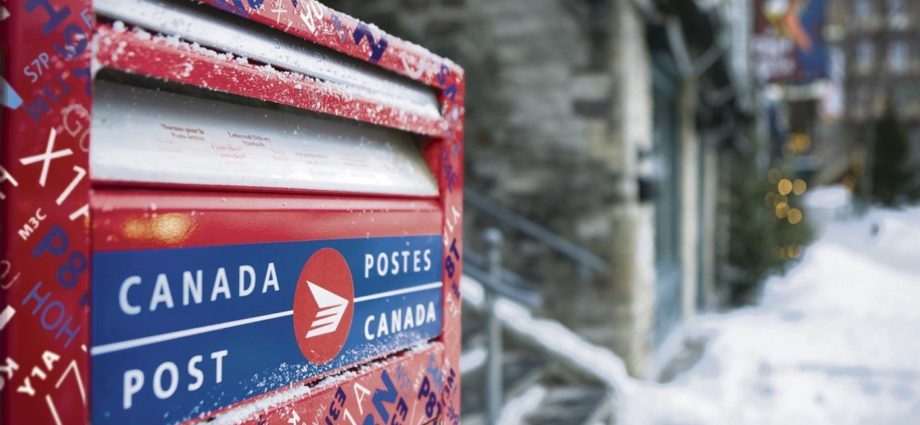Canada Post promises to improve service in northern and Indigenous communities.
Canada Post has said it is working to improve its service in the province’s far north. Photo courtesy Canada Post
By Michael Bramadat-Willcock, Local Journalism Initiative Reporter, The Northern Advocate
Dec 08, 2020
Canada Post has announced a reconciliation strategy that includes improving service in more remote northern communities.
Canada Post President and CEO Doug Ettinger outlined four ‘key pillars” to the strategy saying Canada Post will take a “tailored approach” in consultation with regional leadership to strengthen its network in Indigenous and northern communities.
The plan allows for some communities to see new full-service post offices, while others will see existing services improved, depending on their own priorities.
“Options include centralized delivery such as parcel lockers and improved access to financial, remittance and government services,” Ettinger said.
“Improved service will foster local economic activity and provide greater access to the e-commerce economy.”

Rick Laliberte Incident Commander at the Emergency Operations Centre in Beauval said Canada Post has become especially important in the north since the province shuttered the Saskatchewan Transportation Company (STC) in 2017, citing a decline in the number of users and a yearly cost of about $17 million.
“Just when we were getting STC freight service up in the north, just when we thought the north was building capacity — well, it got pulled away by our provincial government. But I’m glad to see that the Federal Government is trying to address these grievances. Hats off to Canada Post for making that effort,” Laliberte said.
He said as Saskatchewan’s north continues to struggle with outbreaks of coronavirus, and with the holiday season coming, postal service is of critical importance.
“In this COVID reality … it’s an utmost essential service. Especially with Christmas, the way it’s unfolding for us. We’re heavily recommending that people do their shopping online, so it’s delivered to their homes. Since we don’t have FedEx or UPS up here, Canada Post is our main supply,” Laliberte said.
Because mail in northern Saskatchewan is processed in Saskatoon, Laliberte said that even mail sent between nearby communities can take a long time to reach its destination, especially if it’s moving between the northeast and northwest.
He said there are different mailing routes throughout the north that change periodically.
“I put a mail letter into Île-à-la-Crosse this morning and I was told by Canada Post that it’ll be going to Saskatoon to be cleared and then come back up. There used to be a distribution service here at some point in time, but that policy changed,” Laliberte said.
“If you send mail from La Ronge to the west side, I don’t know if there’s a direct connection now. Another odd one was Sandy Bay and Pelican Narrows on the east side. If you wanted to send something from Sandy Bay to Pelican Narrows, (mail) would have to go to Winnipeg and then Saskatoon first to get to Pelican.”
These logistics are compounded in communities such as La Loche in the northwest, where one full-time front-line employee has borne the brunt of increased demand for postal services during the first wave of coronavirus, and again with the holidays coming.
La Loche Mayor Georgina Jolibois, who is a member of the Clearwater Dene First Nation, said she hopes to see more postal workers hired full-time to make up for increased demand and that those who are already employed be provided with a living wage while doing their jobs.
“I know that there is a full-time employee and many work part-time or casual hours. I know that it would be very helpful if the hours made it suitable for a person on the wages of Canada Post. The employee works diligently and he’s very good but I know that he gets overworked. He needs the support,” Jolibois said.
“I believe all of the staff are Indigenous and I think one thing that they would like to see, based on my discussions with them, is that with the increased workload Canada Post ensures sufficient hours to make a living.”
Canada Post also promised to extend its current Canadian suppliers to ensure they engage more with Indigenous communities and work on improving Indigenous recruitment and retention.
Canada Post said it will work with law enforcement and in collaboration with community leaders and local Indigenous law enforcement, to reduce the amount of “non-mailable matter,” such as alcohol and illicit drugs, that enter these communities.
Mayor Jolibois pointed out that no municipalities in Saskatchewan currently prohibit alcohol, while there are “dry” policies that apply in specific Indigenous communities around the country. She said she is “interested to know” how Canada Post intends to deal with that particular issue.
“I’m extremely proud that Canada Post is moving forward with its Indigenous and Northern Reconciliation Strategy,” Ettinger said.
Subscribe to our newsletter.
“It commits us to taking concrete action to renew our long-standing relationship with Indigenous and northern communities.”

